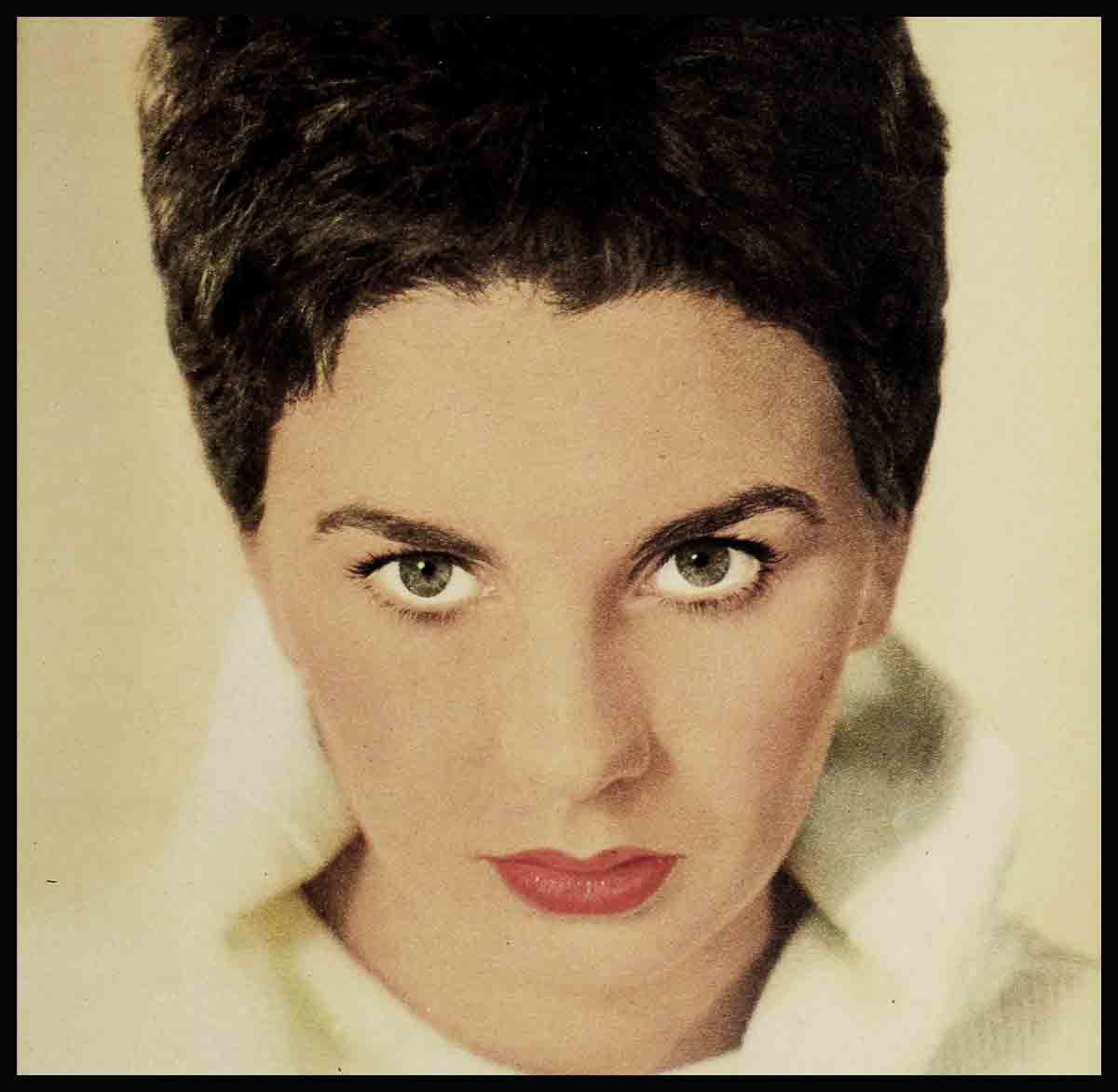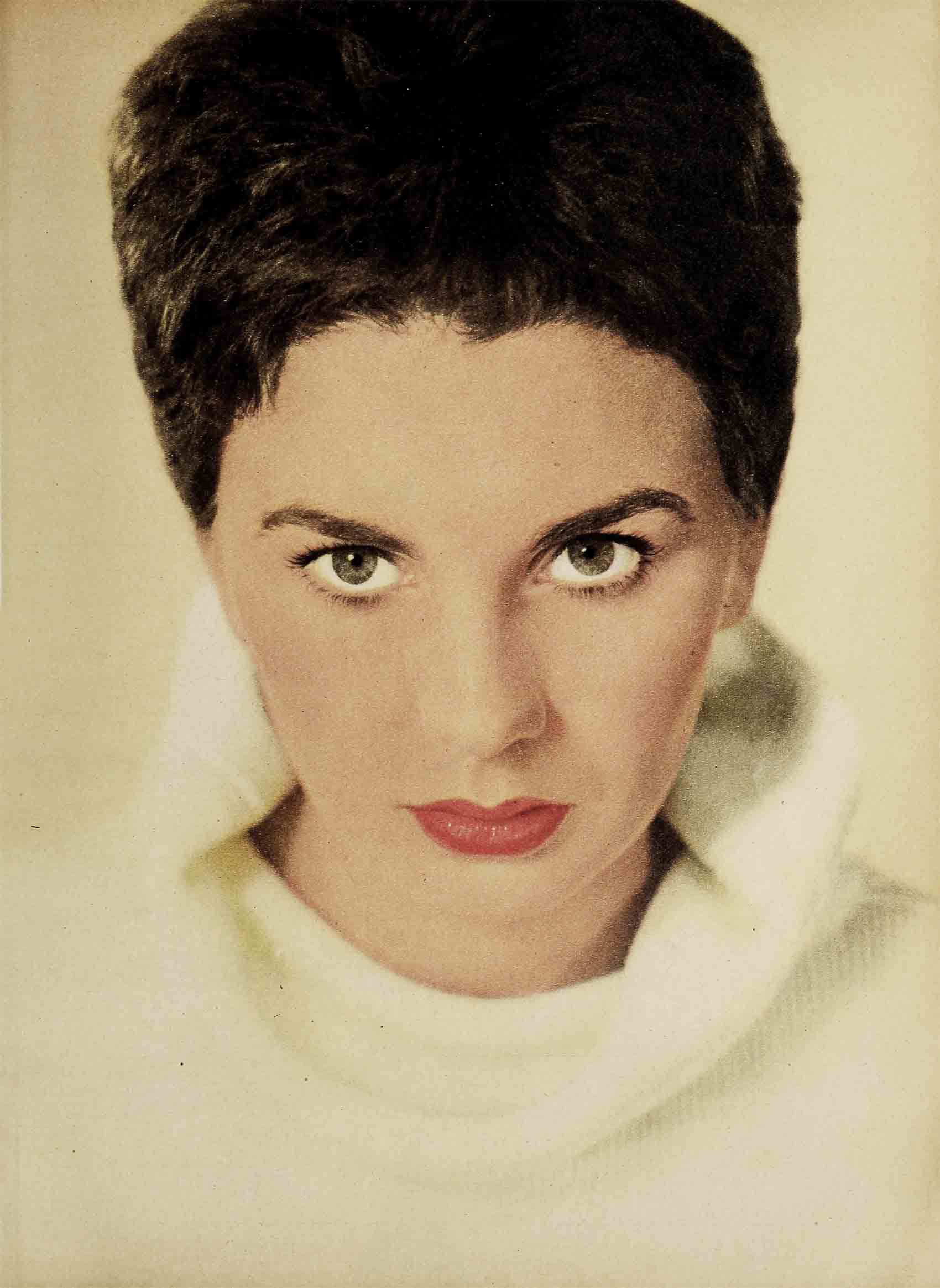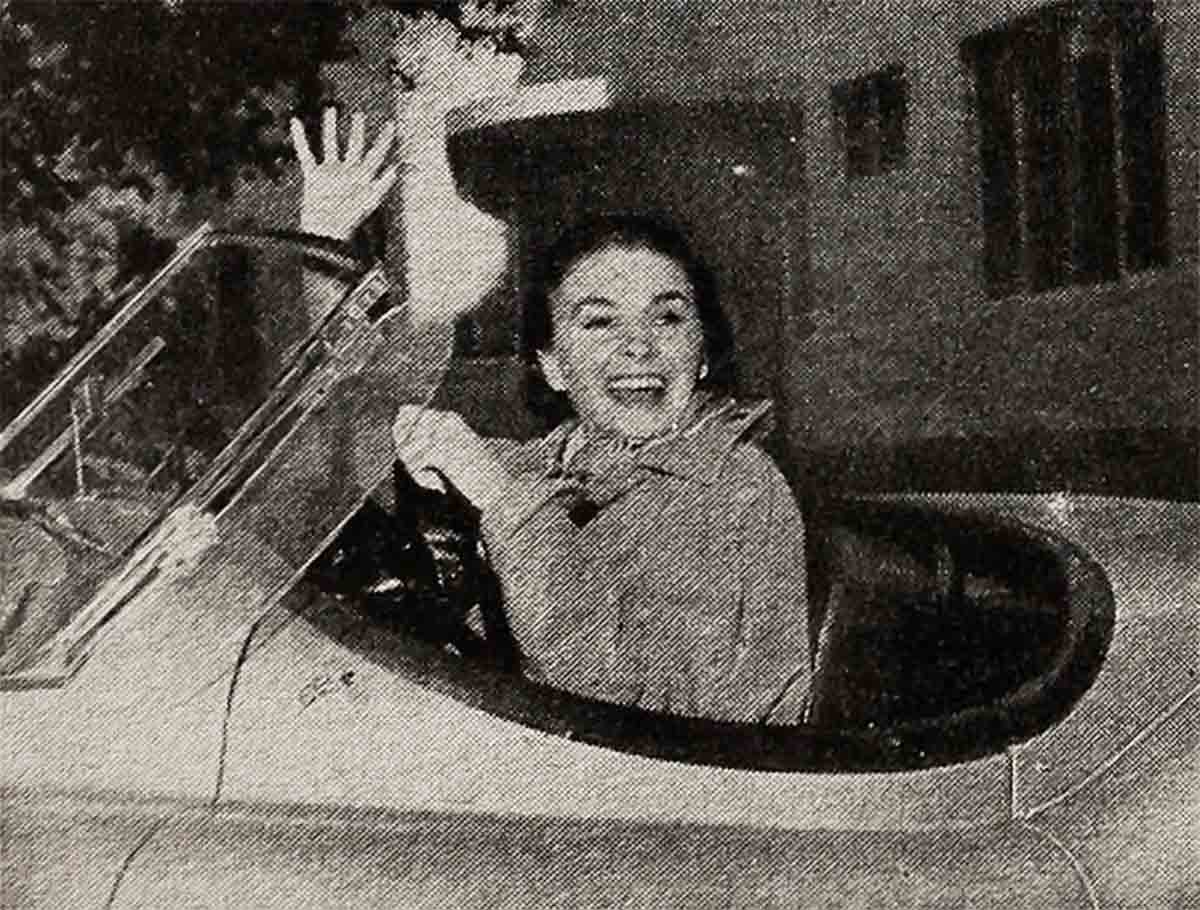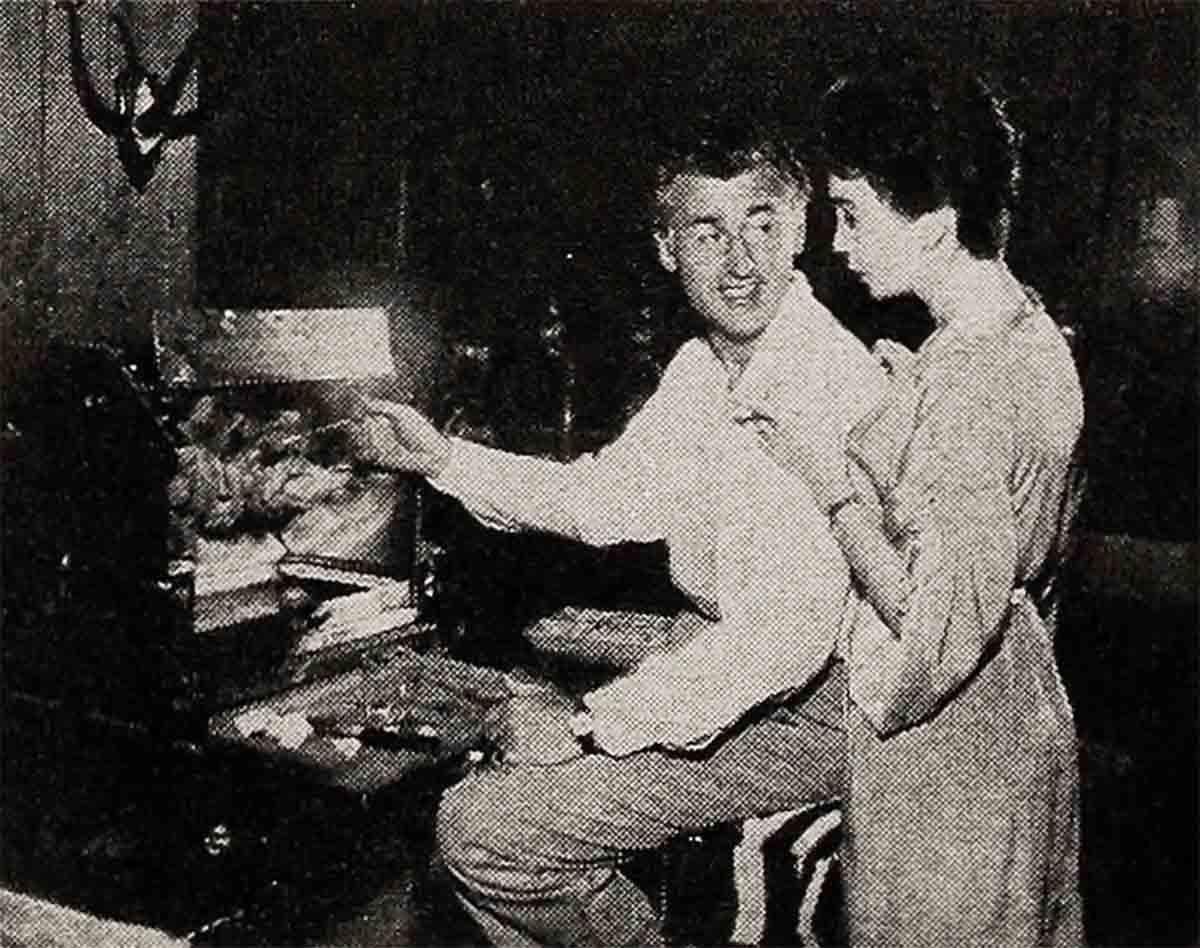
If She Could Only Cook—Jean Simmons
Once there was a little English girl whose life got off to the most glorious start any little girl could think of. She was a movie actress! She not only had talent, she had an appetite for fun and an attitude that as much as asked: “What’s the point of good fortune if you can’t live it up a bit?” And that’s what Jean Simmons did.
She had a little racing roadster for flying around the countryside, she had a lovely flat in London with a housekeeper to do for her, and she had a hatful of dashing admirers to take her nightclubbing in gay film parties until dawn caught up with the revelers and they had to scramble back hilariously to the studios without a wink of sleep.
Some of her friends used to say, “Oh, Jean has made good in such a hurry she’ll never bother to grow up!” But she knew they were wrong. She knew she would grow up—and like all women, all too soon. In the meantime, why, what could mean more than the fact that you were young?
That was hardly five years ago. Today Jean Simmons is in Hollywood and when her friends telephone her at home, or at her dressingroom suite at 20th Century-Fox Studios, they often begin with, “Is this ‘Dreadful’ Simmons?”
“Righto!” Jean will admit. “That’s me!”
It’s a joke, of course, yet it is founded on the supposition that Jean, if you didn’t know any better than to believe local gossip, is a frosty-natured gal ready to bite off the head of anyone who wants to be friendly.
In England, people used to like to crowd around her and reporters always asked, “What’s up, Jean? Been any place important? Got any plans we ought to know about?” In Hollywood most of them now tell each other that she is quite unapproachable, quite uncooperative. Some—and she has to smile about this, especially—even say it is because she is English—“and so reserved, you know.” And there are newspaper people and writers who have advised each other: “Don’t try to do an interview with Jean Simmons. She’ll just sit around and resent you!”
This conception of her as an aloof type came only after she had left England and arrived in Hollywood. She had been essentially as lighthearted as ever then—though without the former need to be wildly impetuous about it. Her youthful curiosity about gay living had been so well satisfied that it wouldn’t matter to her if she never got inside another nightclub.
She had been as happy when shortly after her arrival in California she eloped to Arizona to marry her Jimmy—the Jimmy Stewart who had to change his name to Stewart Granger when he became a star in a screen world which already had one Jimmy Stewart.
Then came her legal fight with Howard Hughes (and Jimmy made it his fight too, of course) over an extended contract for her services which Hughes claimed to, have and they insisted he did not. It was then that Jean, who felt that her rights were being threatened, and who resented the columnists’ constant references to the fact that her husband was so much older than she, began to wonder about Hollywood. She used to ask, “Do all people here behave like this?”

Hollywood, she came to realize, could learn to like new-comers quickly only if they fitted into a familiar pattern. She and Jimmy obviously didn’t; what was the use of kidding about it? Their personalities were not to be gathered up and catalogued in one quick look or scratchy interview. It was to take time for Hollywood to get to know Jean Simmons and Stewart Granger—and for them to know Hollywood.
Now something has occurred which indicates that the time may have arrived. Jean was talking to one of her studio’s publicists and she quietly agreed to be interviewed—her first real interview in almost a year. That happened toward the end of the filming of The Egyptian. Not once during the shooting of The Robe had she consented to talk for publication. So her words were a pleasant surprise.
“You mean you’re not peeved at the world of journalism any more?” he asked.
“I don’t think I ever was, really,” Jean replied. “I was angry only at the people who have tried to hurt me by being very careless with their words and suppositions. And you know, when you are in that sort of mood your resentment tends to overlap and take in others as well.”
Jean is too friendly and open to continue a remote social existence in a community where she and her husband are establishing themselves successfully, and among whose citizens they will probably be living for many years to come. He has had his troubles in Hollywood too; not only on her account, because he has always been quick to shield her from attack, but also because he never soft-pedals any of his opinions.
This habit of making the forthright response, which has hitherto rubbed people the wrong way, now and then seems to win Stewart respect and even friendship. His handling of the ticklish question as to whether or not he and Jean plan to become American citizens (a step that always perturbs British actors, not to speak of their British fans) is one of the most blunt, yet adroit, noted in Hollywood.
“After all, you’ve been in Hollywood more than four years,” a columnist said to him. “And you are making a living here. Don’t you think it’s time to decide to become an American?”
“Why, I’ll leave it to you,” said Stewart. “Suppose you, born and bred an American, had worked in England for four years. Would you think it time enough to decide whether to become a British subject? Or would you want to deliberate some more?”

The writer, unable to contemplate giving up his citizenship at any time under any conditions, grimaced and then smiled weakly. “I see what you mean,” he said.
Jean knows that the sweetening of her relations with Hollywood and the press means that she is going to find herself busier than ever fulfilling publicity and industry obligations which will be sure to start piling up. This will be troublesome because Jean has been and is going to continue to be a very busy girl.
The Egyptian is her twenty-fifth picture. By the time you read this she will be working with Marlon Brando in Desiree and other productions for her are in the planning stages. She hopes to manage anyway. She is bothered by the possibility that she and Stewart will not be able to live as quietly as they have. She enjoys the quiet informality of their life.
They spend a bit of time with the Michael Wildings. It is getting so that when Jean Simmons and Elizabeth Taylor sit together now they look enough alike to be sisters. They see a few other friends, but mostly they are “home bodies.”
When they lunch out occasionally they like to lose themselves in the crowds at the Farmer’s Market. They seldom dine at the flashy steak tabernacles, preferring the more solid, if quieter, establishments like Scandia and the Cock and Bull.
Their home today is a three-bedroom, ranch-style house high on Mulholland Drive. They bought it after deciding that their first home—a $125,000 Bel Air residence which they have not yet been able to sell—was too large a pile of stone for one couple. “Stewart was like any new husband,” says Jean when defending his purchase of this extravaganza. “He felt like starting off with his bride in a house that was built for the ages. The only trouble was that it was like a forgotten castle; and you could easily get to feel the same way yourself, tucked away in a corner of it. That wasn’t so good.”
Just as they have been trading homes, Jean and Stewart have been doing some automobile trading as well. Stewart had a blue Jaguar until last year when he decided to give the Jag to Jean and get himself a new Mercedes-Benz. Then Jean decided she wanted a Mercedes-Benz, too, and traded the Jaguar for one.
And Jean is no slouch at driving. She used to hit 100 miles an hour between London and the movie studios at Pinewood in her little English racer. In her Jaguar she has been clocked out on the desert at 135 miles per hour which is just about as fast as it can go and faster than it should.
Stewart took over the cooking as soon as they were married and still does it. They cannot understand why people persist in thinking this an extraordinary arrangement. As Jean has said a hundred times: “It isn’t that I don’t want to cook. It’s that Jimmy is so much better at it! Isn’t it silly for an amateur to be cooking for an expert?”

Jean explains to anyone who is interested, that she had tried sometimes to do the cooking. The last time she announced that dinner was to be barbecued chicken. Well, the chicken wasn’t so bad when it finally came off the spit. The green vegetables she cooked were not bad, nor were the baked potatoes—nor the appetizer and salad. The trouble was the timing. They had reached edibility at staggered intervals—badly staggered. Jimmy has not been unkind about it, but has proposed that they use a bit of common sense.
“You stick to acting, darling, and make some money,” he advises. “I’ll try and do the same, but also handle the cooking.”
Jean thinks this is common sense and she plans to do just that; keep acting and keep making money until something happens that she hopes will happen soon in her marriage; Jean wants children. Stewart, the father of two children by his first marriage, even talks about retiring from pictures some day to become a farmer, and Jean is perfectly caught up with the idea. “I’d love to raise youngsters on a farm,” she says.
As it is, Jean no sooner gets home from the studio than she transforms herself into a farmhand, donning either jeans or slacks usually topped by one of Stewart’s sweatshirts. She always orders light lunches at the studio to make sure she will have a good appetite for Stewart’s dinner, and the meal is invariably served, not in the diningroom, but from a tray set in front of the television set in the living room. A third diner will be Bill Rushton who has been Stewart’s chauffeur, groom, dresser and general factotum for years. Occasionally they will have a guest for dinner and most often he will be Spencer Tracy, a friend ever since Jean and he starred in The Actress together. Spencer loves to eat Stewart’s steaks and belittle his politics.
There is almost always an argument about the choice of TV programs. Jimmy and Bill want to watch boxing and can always dig a fight program out of some channel. Naturally, they don’t force their preference on her—they are democratic and always take a vote, which, unfortunately, is always two-to-one against her. Jean, who wants to look at such favorites of hers as Groucho Marx and Burns and Allen and Jack Benny and Omnibusand Sid Caesar, most often finds herself, like so many long-suffering wives, watching “Kid Something Or Other” wallop the stuffing out of “Kid Somebody Else.”
Spencer Tracy told her at one dinner she should assert herself in this unfair situation. “Insist on seeing what you like,” he had advised.
“Tonight?” she asked.
“Him-m-m. Not tonight,” Spencer stalled. “There are some special fights on tonight and I’d sort of like to see them myself.”
Stewart’s choice of television programs is about the only kind of decision he makes that Jean criticizes. She leans heavily on him for advice about her career, her clothes and even her make-up. His judgment and taste are excellent, she thinks. “Mine isn’t by any means,” she reports.
It was Stewart who decorated their home and if it seems a bit extreme (original paintings hang alongside his African trophies—the mounted head of a giant Cape buffalo, for instance) she believes it’s just because style and custom haven’t caught up with him.
Stewart has a set of personal values which Jean is catching up with and beginning to understand. If she scores a professional victory at the studio he will be pleased, but he can be more highly impressed, sometimes, hy evidence of self-improvement in personal traits. When Jean decided to quit smoking his admiration was unexpectedly overboard. “Good girl!” he kept telling her. “Stick to it!”
Unfortunately, Jean proved to be more ordinarily human than heroic in this little drama. In a few days she found herself sneaking puffs in the bathroom. She quickly decided she couldn’t go on living any longer in a false light and that it would be best to confess. Such as she is, and such as he is, they have been getting along famously. She didn’t want any lie to come between them. And none ever will if she can help it.
THE END
—BY LOUIS POLLOCK
It is a quote. MODERN SCREEN MAGAZINE AUGUST 1954




